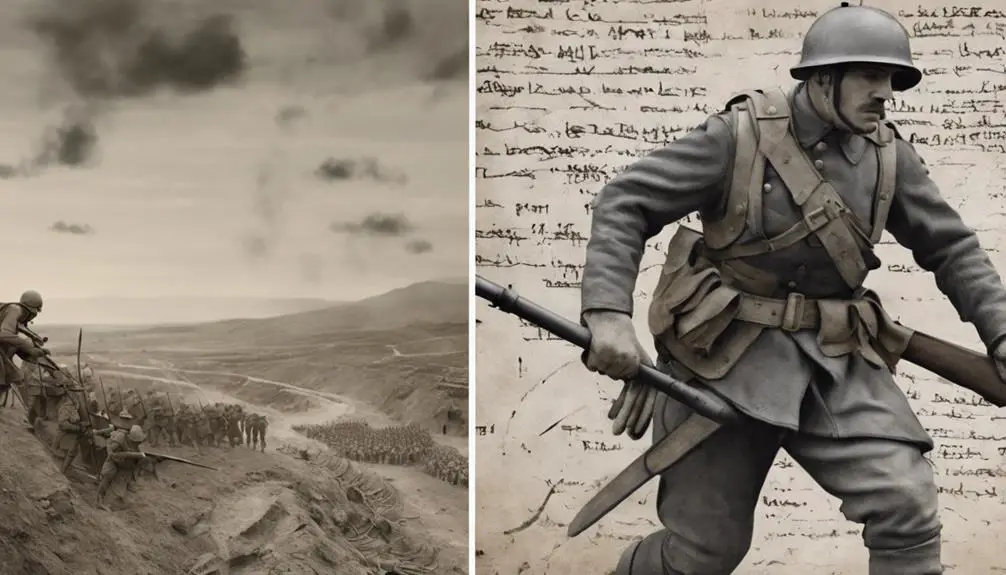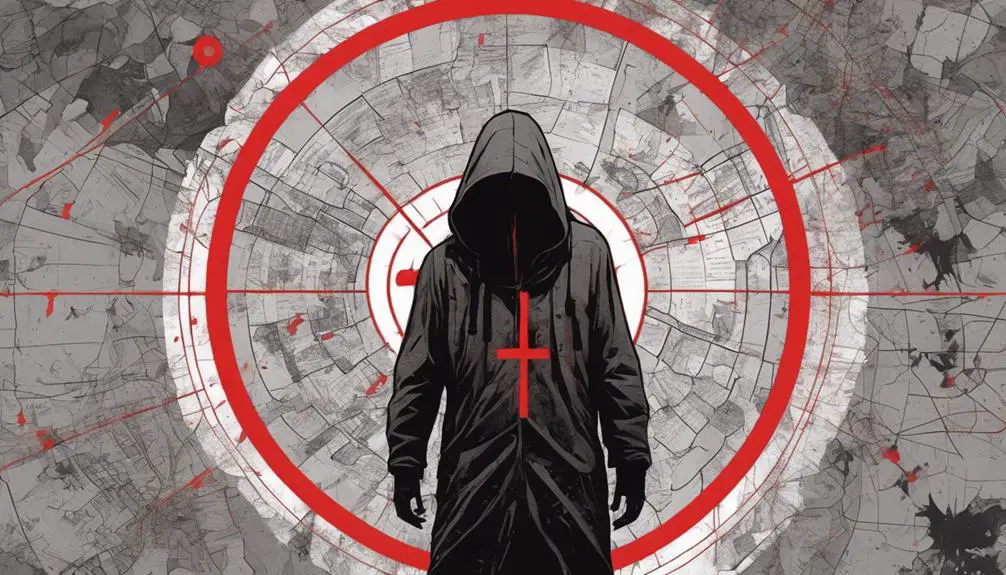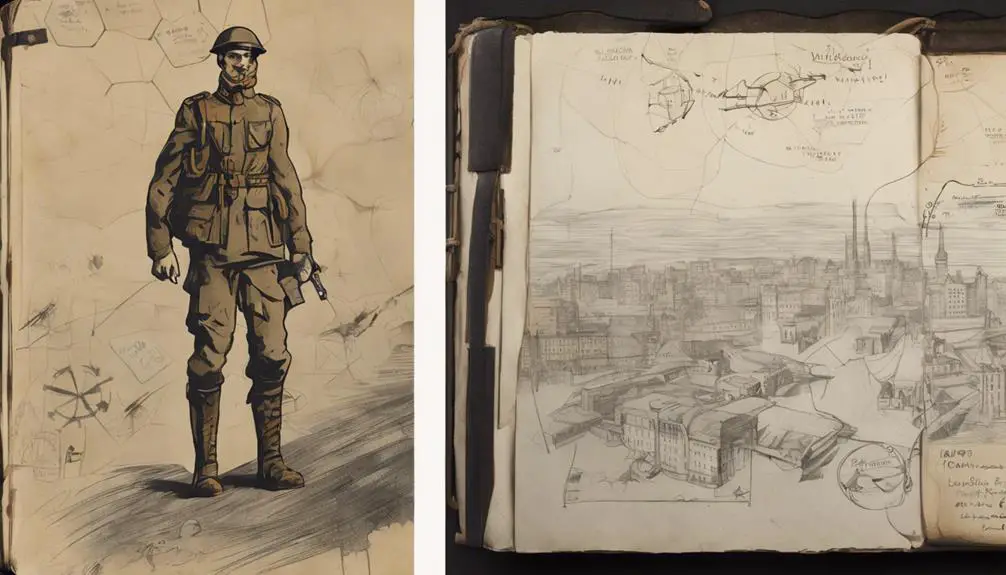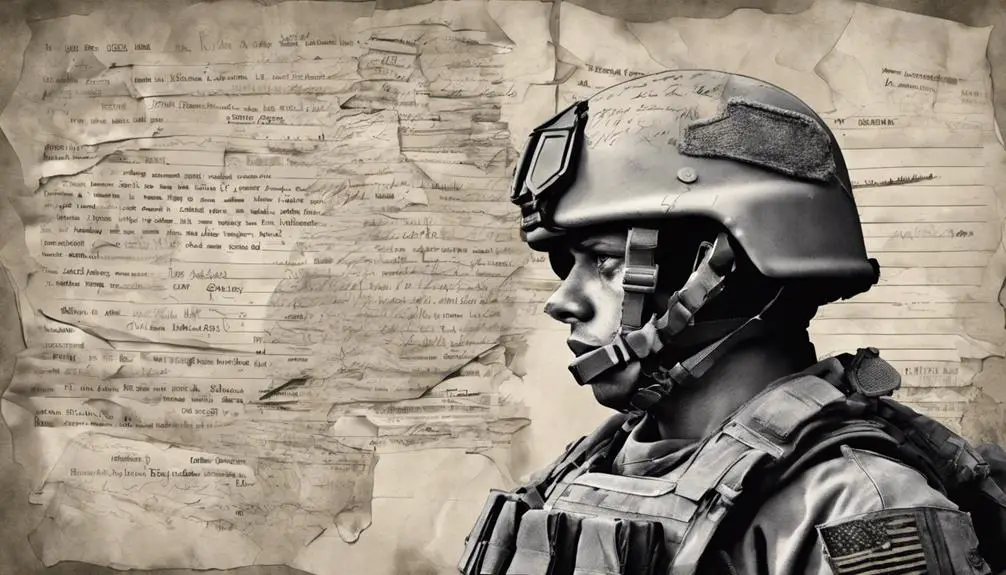You use military slang to refer to the enemy because it's an essential psychological tactic that's been employed for centuries. In ancient Greece and Rome, adversaries were dehumanized and likened to animals or inferior beings. This tactic continued in the Vietnam War with terms like 'Charlie' for North Vietnamese forces. Today, code names and slang terms are used to describe enemy forces, facilitating communication and psychological distancing. As you explore the evolution of enemy designations, you'll discover how military slang adapts to modern conflicts, from asymmetric warfare to cyber threats, and how it continues to play an important role in maintaining operational security.
Historical Roots of Enemy Slang

Since the dawn of modern warfare, soldiers have employed derogatory terms to dehumanize and demoralize their enemies, a practice that has persisted across cultures and centuries.
You might assume that these terms are simply born from hatred or anger, but an etymological analysis reveals a more complex history. Ancient adversaries, such as the Greeks and Romans, used derogatory terms to dehumanize their enemies, often linking them to animals or inferior beings.
For instance, the Greeks referred to their Persian enemies as 'barbarians,' implying they were uncivilized and inferior. Similarly, the Romans used the term 'Brittunculi' to demean the Britons, implying they were weak and feeble. This practice has continued throughout history, with soldiers using slang to create a psychological distance from their enemies.
As you explore the historical roots of enemy slang, you'll discover that these terms often reflect the cultural and social attitudes of the time. By examining the origins of these derogatory terms, you'll gain a deeper understanding of the psychological and sociological dynamics at play in warfare.
Vietnam Era: Charlie and Beyond
As you move into the Vietnam era, you'll find that American soldiers adopted a distinct set of slang terms to dehumanize their enemy, with 'Charlie' becoming the ubiquitous label for the North Vietnamese forces. This labeling allowed soldiers to distance themselves emotionally from the enemy, making it easier to engage in combat.
| Term | Meaning |
|---|---|
| Charlie | North Vietnamese forces |
| Victor Charlie | Vietnamese communist |
| Tunnel Rats | US soldiers who cleared tunnels and underground bunkers |
| Firebase Life | Life at a temporary artillery base |
During this era, soldiers also used slang to describe their experiences and environments. For instance, 'Firebase Life' referred to the daily routine at a temporary artillery base, while 'Tunnel Rats' described the brave soldiers who ventured into underground tunnels and bunkers to clear out enemy hiding spots. These slang terms became an integral part of the military's culture and communication, allowing soldiers to quickly convey complex ideas and emotions in the heat of battle.
Modern Conflicts and Code Names

In modern conflicts, you'll encounter a new set of code names and slang terms that demonstrate the military's ongoing quest for secure communication and psychological distancing from the enemy. The modern battlefield has introduced new threats, such as cyber warfare, where enemies are referred to as 'advanced persistent threats' (APTs). You'll also hear terms like 'insurgent' or 'non-state actor' to describe enemies in asymmetric warfare.
Drone surveillance has become a key component of modern warfare, and enemies detected through this means are often referred to as 'high-value targets' (HVTs). The military also uses code names for specific operations, such as 'Operation Inherent Resolve' against ISIS. These code names serve to maintain operational security while also providing a psychological buffer between the military and the enemy.
In modern conflicts, you'll also notice the use of acronyms to describe enemy forces, such as 'VBIED' for vehicle-borne improvised explosive devices. These terms enable the military to communicate effectively while maintaining a level of detachment from the enemy. As modern warfare continues to evolve, you can expect the development of new slang terms and code names to adapt to emerging threats.
Cultural Significance of Slang Terms
As you explore the world of military slang, you'll discover that terms like 'Charlie' or 'Tango' for the enemy are more than just convenient abbreviations. Military slang terms for the enemy, such as 'Charlie' or 'Tango,' not only facilitate communication but also reveal the cultural significance of psychological distancing in warfare, where dehumanizing the enemy can become a coping mechanism for the psychological toll of combat.
These slang terms often reflect a psychological need to create distance between oneself and the enemy, allowing soldiers to cope with the moral and emotional burdens of war. This phenomenon speaks to the concept of Slang Identity, where language is used to create a sense of community and shared understanding within a group.
In this context, slang terms for the enemy can be seen as a means of asserting Cultural Power, where the dominant group (in this case, the military) imposes its own language and norms on the enemy.
Code Switching in Combat Zones

You're likely to encounter code switching in combat zones, where soldiers seamlessly switch between formal military communication protocols and informal slang terms like 'Victor Charlie' to refer to the enemy, depending on the situation and audience. This linguistic agility is vital in combat linguistics, as it enables soldiers to adapt to diverse contexts and communicate effectively.
In the heat of battle, clear and concise communication is paramount, and code switching allows soldiers to convey complex information quickly and accurately.
Battlefield idioms like 'Charlie' or 'VC' for the Viet Cong are used in informal settings, such as among squad members, to maintain a sense of camaraderie and shared experience. However, in formal situations, like reporting to commanders or communicating with external agencies, soldiers switch to formal protocols to guarantee clarity and precision.
This code switching is a hallmark of military communication, allowing soldiers to navigate the complexities of combat linguistics with ease. By mastering this linguistic dexterity, soldiers can focus on the task at hand, ensuring mission success and minimizing misunderstandings.
Slang and Operational Security
Employing slang terms for the enemy, like 'Victor Charlie', can inadvertently compromise operational security if used in unsecured communication channels or in the presence of unauthorized personnel. You must be mindful of the risks of security breaches when using these terms in casual conversations or on open communication networks.
Remember, the enemy is always looking for ways to gather intelligence, and using slang terms in unsecured channels can give them valuable insights into your operations.
To avoid security breaches, it's essential to use secure communication channels, such as encrypted radios or secure messaging apps, when discussing sensitive information. You should also limit the use of slang terms to authorized personnel with a need-to-know clearance. By doing so, you can minimize the risk of compromise and ensure that your operations remain secure.
In high-stakes environments, secure communication is paramount. You must prioritize secure communication practices to prevent security breaches and protect your operations from unwanted attention. By being vigilant and proactive, you can safeguard your operations and maintain the upper hand in the field.
Evolution of Enemy Designations

Through the lens of military history, the terminology used to designate the enemy has undergone significant transformations, reflecting shifting operational contexts, tactical adaptations, and strategic adjustments. As you explore the evolution of enemy designations, you'll notice a pattern of adaptation to emerging threats and changing combat environments.
Combat labels have been refined to accommodate new enemy typologies, driven by factors such as technological advancements, shifting geopolitical landscapes, and the rise of non-state actors. This evolution is evident in the following key developments:
- Enemy categorization: Early 20th-century militaries employed broad categorizations, such as 'friend' or 'foe.' Later, more nuanced labels emerged, distinguishing between combatants and non-combatants.
- Asymmetric warfare: The rise of irregular warfare and terrorism led to new designations, such as 'insurgent' or 'terrorist.'
- Cyber threats: The emergence of cyber warfare has prompted the creation of labels like 'advanced persistent threat' (APT) to describe sophisticated cyber adversaries.
- Non-state actors: The growing influence of non-state actors, such as criminal organizations, has led to the development of labels like 'violent extremist organization' (VEO).
- Context-dependent labels: Modern militaries now employ context-dependent labels, such as 'high-value target' (HVT) or 'high-payoff target' (HPT), reflecting the dynamic nature of contemporary combat environments.
Frequently Asked Questions
Are There Specific Slangs for Different Branches of the Military?
As you explore military slang, you'll find that each branch has its unique lingo. You'll notice Army lingo differences, such as 'Hooah' for enthusiasm, whereas the Navy's slang evolution has coined terms like 'Scuttlebutt' for gossip.
Even within branches, units and regions develop distinct dialects. You'll discover that these variations often stem from historical events, cultural influences, and operational needs.
Can Enemy Slang Be Used to Intimidate or Demoralize the Enemy?
You're about to engage in a mental game of cat and mouse with the enemy. In the domain of psychological warfare, using slang to intimidate or demoralize the enemy is a tactic as old as war itself.
You'll employ fear tactics to erode their confidence, making them question their own abilities. By leveraging slang, you'll create an air of uncertainty, making the enemy doubt their own perceptions.
It's a delicate dance of psychological manipulation, where the goal is to break their spirit without firing a shot.
Are There Any Female-Specific Enemy Slang Terms?
When considering the language used to describe opponents, you'll find that female-specific terms are less prevalent. However, gendered insults aimed at female foes do exist.
These derogatory terms often blur the lines between professional and personal attacks. You'll notice that these slurs frequently rely on stereotypes, emphasizing perceived feminine traits as weaknesses.
Recognizing the impact of such language is crucial, as it can affect morale and create divisions within opposing forces.
Can Civilians Use Military Slang for Enemies Without Offense?
When using slang terms, you should consider the concept of cultural appropriation. Language evolution is a natural process, but adopting terms without understanding their origins or connotations can be offensive.
In this case, using military slang for enemies without being part of the military community can be seen as inappropriate. You must be mindful of the context and potential misappropriation, ensuring that your language use is respectful and considerate of the original cultural context.
Are There Any International Variations of Military Slang for Enemies?
As you navigate the world of linguistic adaptations, you'll discover that cultural influences shape the way we refer to enemies.
Internationally, variations abound. In France, the term 'boche' emerged during WWI, while in Russia, 'vrag' is used. In Japan, 'tekki' signifies enemy aircraft.
You'll find that each nation's unique cultural fabric weaves a distinct tapestry of terminology.
Conclusion
As you reflect on the evolution of military slang for the enemy, remember that language is a battlefield too. Throughout history, soldiers have employed slang to dehumanize, degrade, and demoralize the adversary.
From 'Charlie' to 'Haji,' these terms have become ingrained in military culture. But as the nature of warfare changes, so must our language.
In the digital age, will we ' Ctrl+Alt+Delete' our outdated terminology, or will it 'glitch' our way forward? The future of warfare depends on it.







